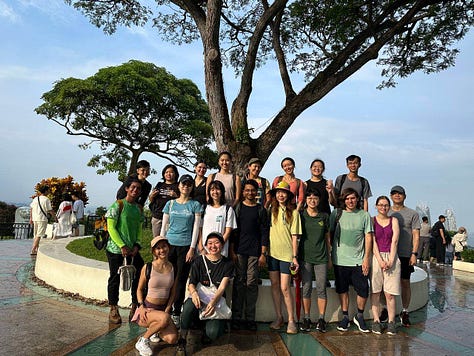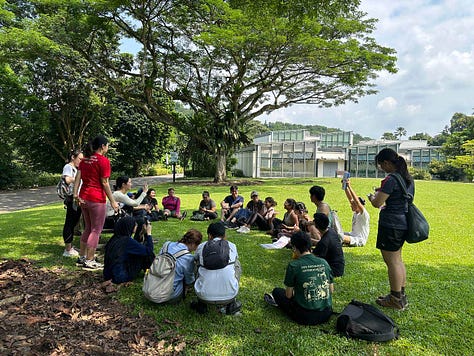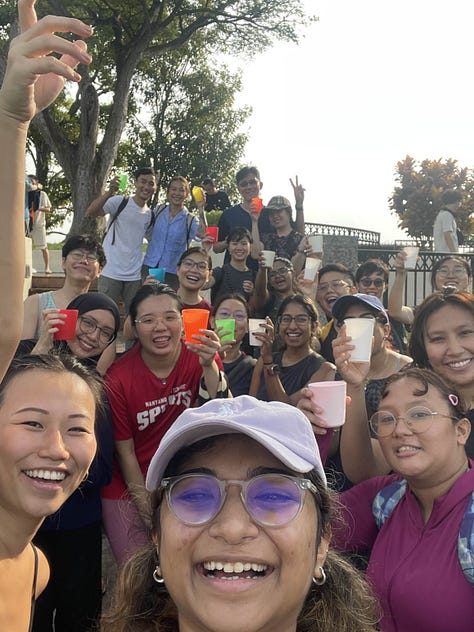Dear friend,
We’ve been on a bit of a break recently, recharging as a movement. But something we’ve been thinking about is growth. Specifically, do we still need growth, and if we do make the decision to still prioritise it, are we prepared to bear the costs of doing so?
We saw this hypothetical question bear out in reality when there was a major oil spill in mid-June, resulting in a clean-up effort that is still ongoing, and will take months to complete. The full environmental impact on the marine biodiversity is still unclear, and as we pointed out in our two-part post, it’s ultimately our environment and our workers involved in the clean-up, who bear the brunt of the impact of our continued focus on the fossil fuel economy.
As the elections near, we hope that some political parties will ask the hard questions, including whether our economic policies are still fit for purpose in a worsening climate. To that end, we’ve contributed to The People’s Manifesto, a grassroots effort that highlights reforms we want political parties to adopt in their manifestos in the coming GE. It is rigorously researched, and more importantly, a truly ground-up democratic effort, driven by a deep desire for everyone to thrive.
For a better world,
SG Climate Rally
We held the latest edition of our Deep Time Walk on 14 July, and were excited to see over 80 of you turn up! Thanks to your generous donations, we raised around 2,000 SGD for the residents of Rempang Island, to aid their continuing efforts to fight against their unjust relocation without proper compensation.



Make sure to follow us on Instagram and Telegram to stay updated on announcements for future editions!
We also released a two-part episode on our Climate Kopitiam podcast, where host Sammie chatted with fellow SGCR member Isaac and Prof. Kenneth Paul Tan from the Hong Kong Baptist University, who had both contributed chapters to a recently-published book by Ethos Books - We Are Not The Enemy: The Practice of Advocacy in Singapore.
How do academic institutions and their actors play a role in promoting social change? Specifically, what kind of research, education, and mediums can we develop in order to take action for climate justice? What are some developments in the environmental movement in Singapore? Listen to them chat about these questions and more on the podcast, and follow us on Spotify to get the latest episodes when they’re out!
Global News
South Korea's Constitutional Court ruled that the country's climate goals were unconstitutional, marking a significant victory for environmental activists. The case, initiated by children and teenagers, argued that the government’s climate commitments were insufficient and violated their constitutional rights to a safe environment. As a result of the ruling, South Korea must revise its climate goals, which currently include a legally binding commitment to reduce emissions by 290 million tonnes by 2030 and achieve net-zero emissions by 2050. The ruling is the first of its kind in Asia, and follows similar wins in Montana in the US, and Germany.
Scientists continue to find further links between climate change and the severity of natural disasters. A joint scientific study by Nanyang Technological University (NTU), Rowan University, and the University of Pennsylvania found that typhoons are now forming closer to the coast due to climate change, resulting in heavier rainfall, stronger winds, and more flooding when making landfall. Researchers from the World Weather Attribution also found that the recent Typhoon Gaemi in July, which struck the Philippines, Taiwan, and mainland China in July, was made more powerful by warmer sea temperatures, which “fuelled” the storm.
Local News
Cllimate Action Tracker (CAT) rated Singapore’s climate targets as “highly insufficient”, an improvement from the previous “critically insufficient”, but stated that more can still be done. CAT cited Singapore’s increased Nationally Determined Contribution targets in 2022, more ambitious 2030 emissions target, and policies such as the Future Energy Fund as reasons for the improved rating. It also stated that as “Singapore is already projected to overachieve its 2030 target, this makes a strong case for increasing ambition in its forthcoming Nationally Determined Contribution (NDC) update”, which is due by 2025.
Meanwhile, Singapore’s push for alternative sources of energy continues. The Energy Market Authority (EMA) on 6 August called for a study to develop a framework of policies and laws to support the adoption of low-carbon hydrogen when it becomes viable. The use of hydrogen as a fuel is still in the research and testing phase, but is three to five times more costly than natural gas at the moment. Earlier, on 31 July, Singapore signed a 30-year agreement with the United States to enhance its understanding of nuclear reactor technologies and safety. The "123 Agreement" allows Singapore access to advanced nuclear research and expertise, particularly in small modular reactors, which are considered more suitable for land-scarce areas such as Singapore.
Want to learn more the ramifications of using sand for construction needs, including land reclamation, and how it plays into the global sand trade? Check out this clip from @eika_pod:
What’s the environmental impact of warfare? In this video by Al Jazeera, the problem of poorly tracked and reported military emissions, as well as the impact of weapons on the environment, is explored:
We also note that the Singapore Armed Forces has committed to reducing the growth of overall carbon emissions by two-thirds by 2030, and to halve the 2030 emissions by 2050. Will there be updates to this target to match Singapore’s more ambitious NDCs?
Finally, David Fogarty from The Straits Times has written an op-ed about the rush for seabed mining, and how a lack of regulation could be disastrous for the environment. This comes amid a new discovery that the metallic nodules at the bottom of the seabed can produce “dark oxygen”, without needing the sunlight that was previously thought necessary for photosynthesis. There should be a moratorium on mining activity until the environmental risks are fully studied, and stringent regulations in place to prevent the overexploitation of the bottom of our seabed, a yet-to-be fully understood marine environment.









I hope this site is educational and not indoctrination focused and must expose our youth to the current scientific discourse about climate change